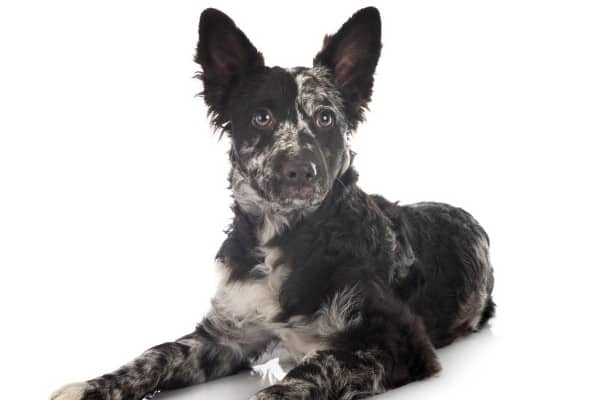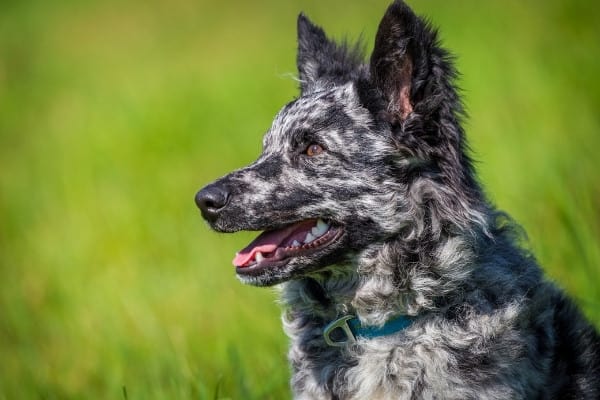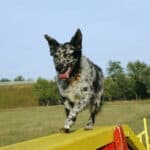
In 2022 the AKC officially recognized Mudi puppies and Mudi dogs. These smart, energetic, and adorable dogs were originally bred as sheepdogs in Hungary but are becoming popular as pets.
If you are interested in welcoming a Mudi dog or puppy into your home, you will need to find a legitimate breeder.
How much do Mudi puppies cost? Mudi dogs cost between $1,000 and $3,000. Mudi dogs are rare, and the breeding stock is very limited. Breeders often charge high prices to make up for the time and money they invest in breeding healthy puppies with good temperaments that match the breed standard.
If you are going to buy a Mudi puppy, it’s a good idea to understand more about the breed and the breeders who offer them.
Read on to learn about the cost, care, and approved breeders for the breed.
Mudi Average Cost & Influencing Factors
Mudi dogs are rare, and breeders are limited. Finding Mudi puppies can be difficult because litters are often claimed before they are even born, and many breeders have long waiting lists.
On average, you can expect to pay between $2,000 and $3000 for a Mudi puppy.
Although the AKC only recently recognized the Mudi breed, Mudis have been included in AKC events since the early 2000s.
Some dogs have extensive pedigrees, which can also drive up the cost of their puppies.
Actual Mudi Prices
|
Breeder |
Price |
Location |
|---|---|---|
|
$1,000 – $2,500 |
Benson, AZ |
|
|
Starting at $2,250 |
Valley Mills, TX |
|
|
Starting at $2,100 |
Benson, AZ |
|
|
Starting at $2,000 |
Racine, WI |
Factors That Affect Mudi Price
When you’re searching for Mudi puppies, there are several factors that can affect the breeder’s asking price.
Small Number of Breeders
There is a very small number of breeders that offer Mudi puppies. They often struggle to keep up with the demand for these puppies and are also working hard to keep the breed standard.
Breeders can ask more for Mudi puppies because there are so few of them.
Limited Gene Pool
There are only a few thousand Mudi dogs in the world, and it can be hard for breeders to find the right dogs for breeding.
They want to avoid inbreeding, but they also have a limited gene pool to work with. This means they may have to breed their dogs less often or source breeding stock from overseas.
Genetic/Health Testing
It’s always good to have genetic and health testing done on potential breeding dogs before breeding takes place.
This can rule out the possibility of genetic conditions, such as hip dysplasia, being passed on to future puppies.
Most dedicated Mudi breeders will have tests and screenings performed. The testing can be expensive, and breeders take that cost into consideration when pricing their puppies.
Care of Parents and Puppies
Many Mudi breeders have both parents on site, and many even raise them as their own pets. They take extremely good care of the parents to ensure the health of the puppies.
Bills for dog food, sanitation, and vet care quickly add up, and the costs of care are usually reflected in the price of the puppies.
Low Supply, High Demand
Now that Mudi dogs have been accepted into the AKC, they are more popular than ever. The demand is much higher than the supply available.
Breeders can and will charge more for puppies that are highly sought after.
Difficult & Expensive To Source Breeding Stock
The limited number of breeding stock means that some breeders do not have both parents on site. They may have to find stock from other breeders.
Most Mudi dogs are located in Hungary. Males are often studded out, and it can be expensive to make travel arrangements to source the breeding stock.
Stock that is shipped to other breeders can have high international shipping fees and have long quarantine periods before they can be released and are ready to breed.
How To Find a Reputable Mudi Breeder

If you are interested in adding a Mudi dog to your family, it’s best to only look at respected breeders.
The AKC Marketplace and the Mudi Club of America offer a list of approved breeders that are working on breeding Mudi puppies for high health and breed standards.
Always avoid backyard breeders and puppy mills, as these breeders are not always considerate of the health or temperament of their puppies or breeding stock.
What To Look For
When choosing Mudi puppies, be sure to look for all of these things:
- Facility conditions
- Breeder experience and knowledge
- Club approved
- One litter at a time
- Provides health check
- Offers health guarantees
- Allows you to see the puppies and parents
- Allow access to the facilities
Red Flags To Avoid
You will want to avoid breeders that demonstrate any of these red flags:
- Sells animals online (especially online only)
- Refuses access to facilities
- Does not offer health checks or guarantees
- Has multiple litters available at one time
- Does not have parents on site
Can I Adopt a Rescue Mudi?
Because Mudis are a rare breed, there are not a lot of them in rescues.
Many breeders require owners to sign agreements saying that they will return puppies or adult dogs if they can no longer care for them. This helps ensure they do not end up in rescues or shelters.
Related Questions:
How Big Is a Mudi?
Mudi dogs are considered to be a medium size. Males range from 16-18½ inches tall and weigh 24-29 pounds, and females are between 15 and 17½ inches tall and weigh between 18-24 pounds.
How Much Exercise Does a Mudi Need?
Mudi dogs were originally bred to be working dogs and herders. They prefer a chance to run and should be walked at least twice a day.
They should also be given at least an hour of free play each day. They prefer fast-paced activities and love to run.
Conclusion
If you are thinking about bringing Mudi puppies or a new dog into your family, it is important to only buy puppies from legitimate breeders.
Mudi dogs make great pets, and when you buy from a responsible breeder, you are more likely to get a puppy that will be happy and healthy for many years.




